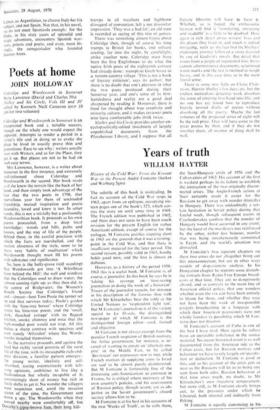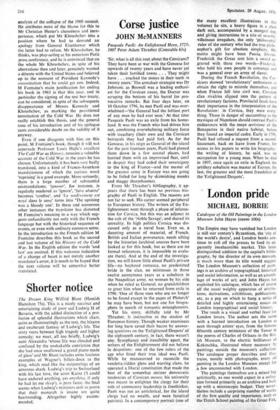Years of truth
WILLIAM HAYTER
History of the Cold War: From the Korean War to the Present Andre Fontaine (Seeker and Warburg 5gns) The subtitle of this book is misleading. In fact its account of the Cold War stops in 1963, apart from an epilogue, occupying six- teen pages out of the book's 523, which car- ries the story on until some time in 1969. The French edition was published in 1965, and there does not seem to have been much revision for the present English (or rather American) edition, except of course for the epilogue. M Fontaine justifies stopping short in 1963 on the grounds that it was a turning- point in the Cold War, and that there is insufficient material for the later period. The second reason, possibly valid in 1965, hardly holds good now, and the first is almost as dubious.
However, as a history of the period 1950- 1963 this is a useful book. M Fontaine is, of course, a journalist. In this book he says he is 'taking his revenge on time-saving journalism in doing the work of a historian'. Traces of the journalist remain, for instance in his description of the famous shoe with which Mr Khrushchev beat the table at the United Nations as 'resplendent light tan'. But M Fontaine's journalism is of the variety special to Le Monde. the distinguished newspaper of which M Fontaine is the distinguished foreign editor—cool, factual and objective.
M Fontaine is not always exempt from the peculiar French suspicion of British motives; the Attlee government, for instance, is ac- cused of wanting to create an 'alternate em- pire' in the Middle East, to be called 'Bevinistan' (an expression new to me), while French motives in supplying arms to Israel are said to be almost purely disinterested. But M Fontaine is fortunately free of the distressing anti-Americanism so common in France, he is critical where necessary of his own country's policies, and his assessments of Russian policy, though severe, are as ob- jective as the Soviet government's absurd secrecy-allows him to be.
M.Fontaine is at his best in his accounts of the two 'Weeks of Truth', as he calls them,
the Suez-Hungary crisis of 1956 and the
Cuban crisis of 1962. His account of the first is weakest perhaps in its failure to establish
the interaction of the two originally discon- nected crises. The Anglo-French action at Suez certainly made it easier for the Russians to get away with murder (literally) in Hungary. There was undoubtedly a cer- tain hesitation in Soviet policy during that fateful week, though subsequent events in Czechoslovakia confirm that the murder of Hungary would have occurred in any event; but the hand of the murderers was reinforced by the other, rather less heinous, murder that was being simultaneously committed in Egypt, and the world's attention was distracted.
M Fontaine's two separate chapters on these two crises do not altogether bring out this interconnection, bui are in other ways models of dispassionate analysis. In his Hungarian chapter he reprints some disturb- ing extracts from Radio Free Europe broad- casts at that time. They arc so dangerously absurd, and so contrary to the main line of American official policy, that one wonders
whether even the CIA can have been entirely to blame for them, and whether they may
not have been the work of irresponsible emigres broadcasting in a language with which their American paymasters were not wholly familiar (a possibility which M Fon- taine does not discuss).
M Fontaine's account of Cuba is one of the best I have read. Here again he suffers from an inevitable imbalance in the source material. No recent historical event is so well documented from the American side as the Cuban crisis, but for Russian motives and behaviour we have to rely largely on'specula- tion or deduction. M Fontaine is good at this, and so his account of the crisis gets as near as the Russians will let us to being one seen from both sides. Russian behaviour at that time owes much, no doubt, to Mr Khrushchev's own impulsive temperament,
but more still, as M Fontaine clearly brings out, to the pressures under which he laboured, both internal and indirectly from Peking.
M Fontaine is equally convincing in his
analysis of the collapse of the 1960 summit. He attributes most of the blame for this to Mr Christian Herter's clumsiness and inex- perience, which put Mr Khrushchev into a position where he had to demand an apology from General Eisenhower which the latter had to refuse. Mr Khrushchev, he thinks, was play-acting at his notorious Paris press conference, and he is convinced that on the whole Mr Khrushchev, in spite of his aberrations then and later, genuinely wanted a ditente with the United States and believed up to the moment of President Kennedy's assassination that he could get one. Indeed, M Fontaine's main justification for ending his book in 1963 is that this year, and in particular the signing of the test ban treaty, can be considered, in spite of the subsequent disappearance of Messrs Kennedy and Khrushchev, as marking the provisional termination of the Cold War. He does not really establish this thesis, and the general tone of his introduction and of his epilogue casts considerable doubt on the validity of it anyway.
Even if one disagrees with him on this point, M Fontaine's book, though it will not supersede Professor Louis Halle's excellent The Cold War as History, remains a valuable account of the Cold War in the years he has chosen. Unfortunately it has been very badly translated, into a kind of Franco-American translationese of which the curious word 'reprising' is a good example. More seriously, there is a large number of substantial mistranslations; 'ignorer', for instance, is regularly rendered as 'ignore', 'faire abattre' becomes 'confine', and `Le soulevement est noye dans le sang' turns into 'The uprising was a bloody one'. In these and numerous other instances the translator has distorted M Fontaine's meaning in a way which sug- gests unfamiliarity not only with the French language but with the historical sequence of events, or even with ordinary common sense. In the introduction to the French edition M Fontaine describes this book as the second and last volume of his History of the Cold War. In the English edition the words 'and last' are omitted. If this welcome indication of a change of heart is not merely another translator's error, it is much to be hoped that the next volume will be somewhat better translated.































 Previous page
Previous page